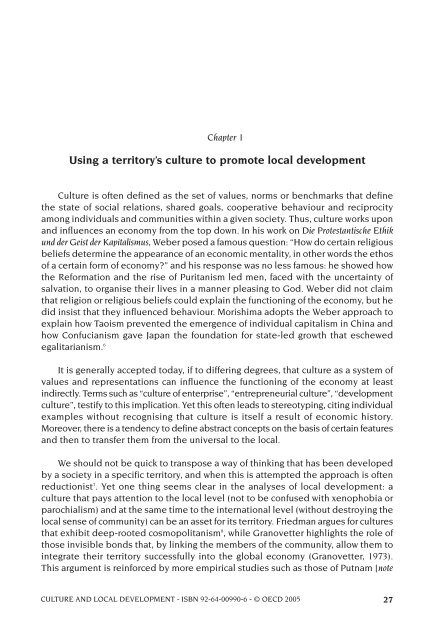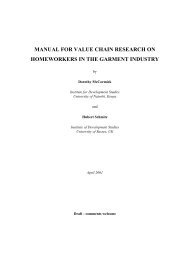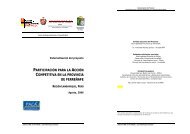OECD Culture and Local Development.pdf - PACA
OECD Culture and Local Development.pdf - PACA
OECD Culture and Local Development.pdf - PACA
Create successful ePaper yourself
Turn your PDF publications into a flip-book with our unique Google optimized e-Paper software.
Chapter 1<br />
Using a territory’s culture to promote local development<br />
<strong>Culture</strong> is often defined as the set of values, norms or benchmarks that define<br />
the state of social relations, shared goals, cooperative behaviour <strong>and</strong> reciprocity<br />
among individuals <strong>and</strong> communities within a given society. Thus, culture works upon<br />
<strong>and</strong> influences an economy from the top down. In his work on Die Protestantische Ethik<br />
und der Geist der Kapitalismus, Weber posed a famous question: “How do certain religious<br />
beliefs determine the appearance of an economic mentality, in other words the ethos<br />
of a certain form of economy?” <strong>and</strong> his response was no less famous: he showed how<br />
the Reformation <strong>and</strong> the rise of Puritanism led men, faced with the uncertainty of<br />
salvation, to organise their lives in a manner pleasing to God. Weber did not claim<br />
that religion or religious beliefs could explain the functioning of the economy, but he<br />
did insist that they influenced behaviour. Morishima adopts the Weber approach to<br />
explain how Taoism prevented the emergence of individual capitalism in China <strong>and</strong><br />
how Confucianism gave Japan the foundation for state-led growth that eschewed<br />
egalitarianism. 6<br />
It is generally accepted today, if to differing degrees, that culture as a system of<br />
values <strong>and</strong> representations can influence the functioning of the economy at least<br />
indirectly. Terms such as “culture of enterprise”, “entrepreneurial culture”, “development<br />
culture”, testify to this implication. Yet this often leads to stereotyping, citing individual<br />
examples without recognising that culture is itself a result of economic history.<br />
Moreover, there is a tendency to define abstract concepts on the basis of certain features<br />
<strong>and</strong> then to transfer them from the universal to the local.<br />
We should not be quick to transpose a way of thinking that has been developed<br />
by a society in a specific territory, <strong>and</strong> when this is attempted the approach is often<br />
reductionist 7 . Yet one thing seems clear in the analyses of local development: a<br />
culture that pays attention to the local level (not to be confused with xenophobia or<br />
parochialism) <strong>and</strong> at the same time to the international level (without destroying the<br />
local sense of community) can be an asset for its territory. Friedman argues for cultures<br />
that exhibit deep-rooted cosmopolitanism 8 , while Granovetter highlights the role of<br />
those invisible bonds that, by linking the members of the community, allow them to<br />
integrate their territory successfully into the global economy (Granovetter, 1973).<br />
This argument is reinforced by more empirical studies such as those of Putnam [note<br />
CULTURE AND LOCAL DEVELOPMENT - ISBN 92-64-00990-6 - © <strong>OECD</strong> 2005 27














